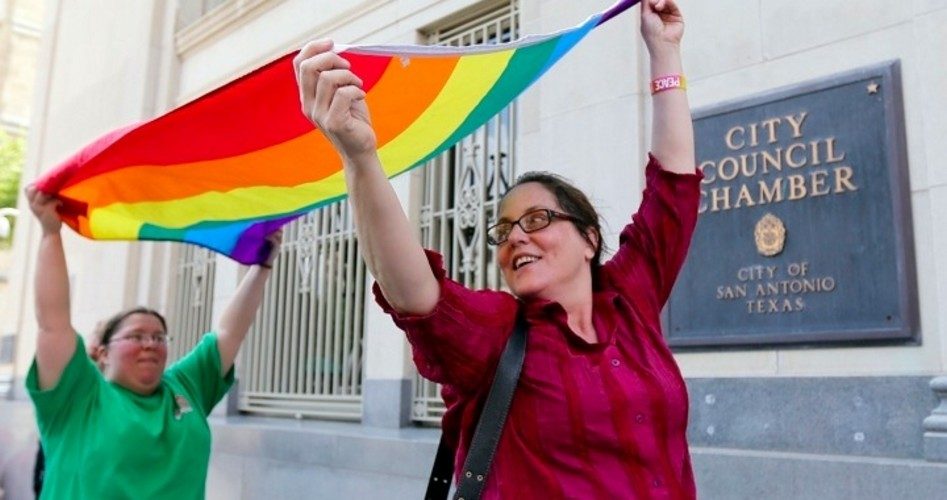
San Antonio has become the latest U.S. city to pass an ordinance giving special protections to gays and lesbians while discriminating against Christians and others who resist the sanctioning of homosexual behavior.
Following a months-long campaign by homosexual activist groups determined to force their LGBT (lesbian, gay, bisexual, transgender) agenda on a largely conservative Catholic community, on September 5 San Antonio’s City Council voted 8-3 to pass a “non-bias” ordinance that adds sexual orientation and “gender identity” to race, religion, age, and disability as classes which are protected against discrimination in San Antonio. In addition to impacting city contracts, housing, and local government, the new ordinance will prohibit business owners from declining to do business with homosexuals or cross-dressing individuals — even because of moral or religious convictions.
San Antonio Mayor Julian Castro, who had pushed aggressively for the law, called it a “common-sense ordinance that’s going to treat everyone equally. Nobody will be a second-class citizen in San Antonio. Here, there will be basic fairness and common decency for everybody.”
But Christian and conservative leaders in the city and throughout the state warned of the consequences of giving special treatment to a group of individuals based on behavior a majority of the community’s residents consider morally wrong. Days before passage of the ordinance a group of local African-American pastors showed up at city hall with hundreds of black and Latino Christians to voice their strong disapproval of the proposed measure. Speaking for the group, local pastor Charles Flowers said that he and other minority Christian leaders opposed the ordinance “because it is based on the notion that those who choose to practice a certain lifestyle cannot change. Yet the preponderance of evidence refutes this.”
Flowers also took issue with comparison of the efforts to normalize homosexual behavior with the historic struggle for civil rights for blacks in America. “The HLGC — homosexual, lesbian and gender-confused community — has sought to piggyback on the civil rights movement,” Flowers noted. “The current HLGC agenda is not a legitimate extension of the civil rights movement. Therefore, we have come to announce a divorce between the civil rights movement and the HLGC agenda, citing irreconcilable differences.”
Before the vote, a conservative group called the San Antonio Human Rights Coalition warned that while empowering homosexuals, the ordinance would effectively make acting on one’s opposition to homosexuality against the law. While agreeing that “all people should be treated with dignity and all share the same fundamental human rights,” the coalition warned that the ordinance “punishes certain people of faith if they attempt to peacefully live in accordance with their beliefs or share their beliefs with others, thereby violating these believers’ human rights of conscience and speech.”
Following the measure’s passage, the Texas-based conservative legal advocacy group Liberty Institute warned that the ordinance will specifically target citizens and businesses who embrace traditional religious views about sexuality, while granting special rights and protections to homosexuals. Among other things, Liberty Council noted, the new ordinance will:
• Expose local government officials “to liability for ‘malfeasance’ if they have ‘demonstrate[ed] a bias by word or deed .. on the basis of … sexual orientation, [or] gender identity … while acting in the official capacity while in such public position.’”
• Prohibit local businesses “from discriminating on the basis of sexual orientation or gender identity in public accommodations, which includes ‘every business within the city … open to the general public and that offers, for compensation, any product service or facility.’”
• Ban landlords from refusing to rent to an individual who is homosexual or transgender.
• Prohibit businesses or individuals contracting with the city from discriminating on the basis of sexual orientation or gender identity.
Several months ago, as opposition to the ordinance increased among local residents, its champions were forced to tweak the law’s language to insist that “nothing herein shall be construed as requiring any person or organization to support or advocate any particular lifestyle.” One of the key supporters of the ordinance, City Councilman Diego Bernal, insisted that “we are not breaking new ground or doing anything revolutionary. We are merely doing what more than 180 cities and towns have done, which is to say that everyone deserves to live free from discrimination.”
But Liberty Institute President Kelly Shackleford called the ordinance a “cloudy and confusing collection of poorly thought out and conflicting statements that could have been more clearly and cleanly handled by simply including a broad religious liberty exemption to protect the free speech and religious liberty rights of both individuals and organizations that have religious objections to the requirements mandated by the ordinance.”
A number of council members spoke out against the ordinance, most of them practicing Christians. “I have sacrificed a lot to serve in this role on city council,” said African-American Councilwoman Ivy Taylor, “but I will not sacrifice my core values and beliefs for political gain or to be in alignment with a particular platform. And if that was the expectation for me as a black woman, [you’ve] got the wrong sister in this seat.”
Similarly, Councilwoman Elisa Chan, also a Christian, said that she was “disappointed that the power of political correctness has prevailed over the freedom of speech.” She added that “most of all I am disappointed that the harmony of the great people of San Antonio has been disrupted.”
Opposition to the measure reached beyond the San Antonio area, with conservative leaders throughout the state weighing in days before the vote. Texas Attorney General Greg Abbott said that the ordinance would “not prevent discrimination, but impose it: stifling speech, repressing religious liberty, and imposing burdens on those who hold a traditional view on human relations.” He added that while the measure “has been couched in terms of liberty and equality, it would have the effect of inhibiting the liberty of expression and equality of opportunity for San Antonians.”
The Virginia-based Liberty Counsel pointed out that similar non-discrimination ordinances have been used over the past year to intimidate Christian business owners and even convict some of discrimination after they declined to serve homosexuals because of their Christian beliefs. “Florists, cake bakers, wedding photographers, sign business owners, and wedding venue owners have already been sued for refusing to serve same-sex unions,” the pro-family group said. The group’s founder Matt Staver said that the ordinance “is not about preventing discrimination,” but “promoting an intolerant agenda directed at Christians, people of faith, and those who believe that homosexuality is contrary to the natural order.”
Staver warned that Christians across the nation “must wake up and realize the agenda behind this ordinance before it is too late.”
Kelly Shackleford agreed, noting that antagonism toward Christianity and other religious expression has increased dramatically across America, and similar ordinances that discriminate against religious faith are now in the works in other cities. “The ripple effect of this law could go far beyond San Antonio,” warned Shackleford. “This is not something that just affects residents of San Antonio. This should alarm every American who values their religious freedom.”
Photo shows supporters celebrating the passage of San Antonio’s “Non-Bias” Ordinance: AP Images


